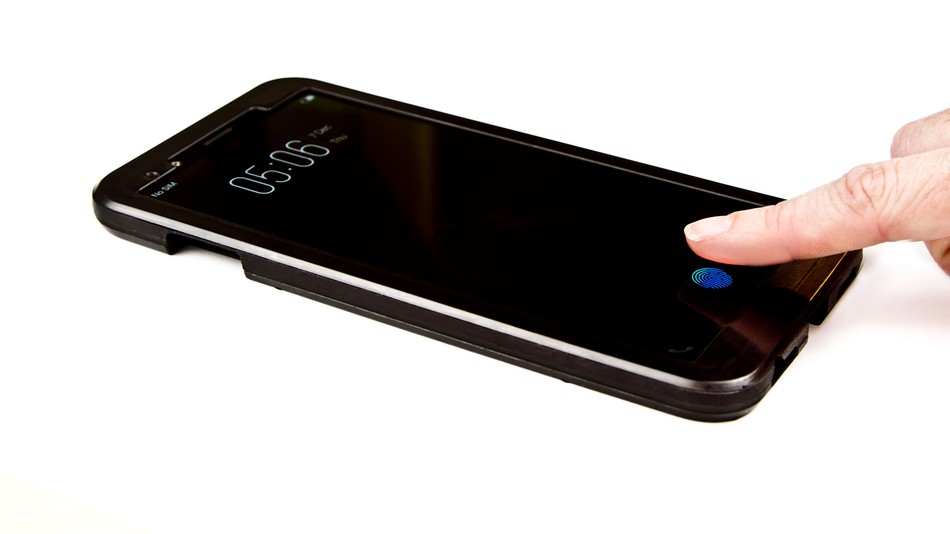Under-screen fingerprint scanners were pegged for 2017’s slew of flagship smartphones, but ultimately the tech just wasn’t ready. While the same was thought of 2018’s upcoming batch due to Samsung Galaxy S9 rumours, it seems that Synaptics has finally cracked the technology.
“Consumers prefer fingerprint authentication on the front of the phone, and with the industry quickly shifting to bezel-free OLED infinity displays, the natural placement of the fingerprint sensor is in the display itself,” writes Kevin Barber, Synaptics's mobile division senior vice president and general manager.
Clear ID FS9500 is the name for Synaptics’ new piece of biometric tech, which it assures us is the “world’s first in-display fingerprint sensor for smartphones.” This might surprise a few of our readers as Qualcomm showcased its own version of the tech in collaboration with Chinese manufacturer Vivo back in June, although this was noticeably slower than current fingerprint sensors on the market.
Of course, it’s likely that Synaptics means its Clear ID tech will be the first introduced into commercial smartphones, particularly on a mass produced level as the company has already geared up for a “Tier 1 OEM.” Moreover, it’s already getting people excited by stating it will appear in the next handset from a “Top 5” smartphone company.
When paired with other terminology used in its press release, the “bezel-free infinity display” and “OLED infinity display” aspects prompt thoughts of Samsung’s Galaxy S9 handset expected early next year. This is contrary to the leak that suggests that it will retain its physical rear fingerprint sensor, but could potentially appear on the Note variant instead or even the higher-end third Galaxy S9 Plus.
It is possible that it will appear on an entirely different handset from a different manufacturer, as these features are quickly becoming a mainstay for mid-to-high-end technology.
KitGuru Says: While I actually prefer the sensor on the back of the phone, I understand that I am a part of the minority there. I can’t help but feel this function will become extremely fragile under glass, especially with the amount of people I’ve known to crack their screens. Does the idea of under-screen fingerprint sensors appeal to you?
 KitGuru KitGuru.net – Tech News | Hardware News | Hardware Reviews | IOS | Mobile | Gaming | Graphics Cards
KitGuru KitGuru.net – Tech News | Hardware News | Hardware Reviews | IOS | Mobile | Gaming | Graphics Cards




What consumer’s prefer them on the front?
That’s a very awkard place to place your finger flat when holding the phone
It seems to be a recurring conversation I have with people and I’m always the odd one out. I think the main difference is that I have a bigger phablet device, whereas it seems a more popular opinion to have it on the front of smaller handsets that are more easily handled.
The main argument seems to be the ability to unlock a phone with as little effort as possible. If the device is on a table then a rear fingerprint sensor, iris scanning, face id all require some kind of ‘preparation’. It’s true when holding a phone normally it could be quite awkward, but this could scan your finger as you take the device out your pocket, for example, rather than having to take it out and perform the action to unlock
Sensors should be were it best suits the obj.. in this case..on the display side…
But IF the new Version regardless of where you end up with your finger.. unlocks the phone..
( the scanner is all over the phone and not in one spot ) I don´t think we gonna have a problem!
And for all those that ” Crack” their screen, how the feck are you handle your phone ?
got mine Galaxy SII for 7 years and all I have is some scratches in one corner since
it slide´d on asphalt. ( get a grip on your stuff, is all I am saying,.., )
The main argument seems to be the ability to unlock a phone with as little effort as possible. If the device is on a table then a rear fingerprint sensor, iris scanning, face id all require some kind of ‘preparation’. It’s true when holding a phone normally it could be quite awkward, but this could scan your finger as you take the device out your pocket, for example, rather than having to take it out and perform the action to unlock
I’m personally a fan of the Sony Xperia fingerprint scanner on the side of the phone running in conjunction with the power button. As long as you configure the fingers you use the most to your fingerprint scanner I find it gives the best of both worlds. Allowing you to unlock your phone as it comes out your pocket but still being able to unlock it when it is on a table as well.
My biggest bug bearer about fingerprint sensors on almost any android phone is not the location of the scanner but in fact the limitation of the number of fingerprints that you have have stored that will unlock the device.